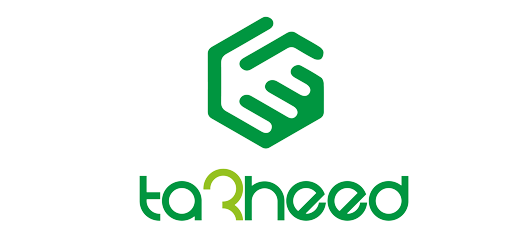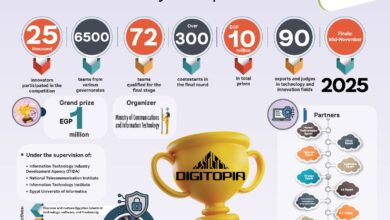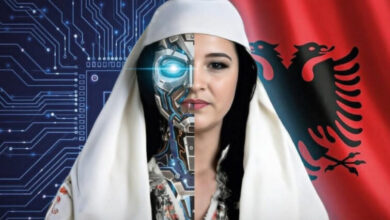How Generations Coexist Within the BPO Industry’s Work Environment

The outsourcing and call center industry is witnessing a clear transformation in the generational dynamics within the workplace.
Between a generation with long experience, relying on direct human relationships, and a new generation raised in the age of technology and Artificial Intelligence, characterized by speed and flexibility, new challenges and opportunities emerge for managing teams and achieving balance within organizations.
This diversity in thinking styles, communication methods, and professional motivations compels companies to reconsider their management strategies, training, and development programs.
This is crucial to ensure the integration of experience with innovation, maximizing the potential of each generation to enhance efficiency and productivity.
Al-Kiki: The New Generation is Characterized by Speed and Flexibility… The Older Focuses on Long-Term Relationships
Mohamed Al-Kiki, Head of Global Operations and General Manager of Sutherland in Egypt and the UAE, stated that the outsourcing services industry in Egypt is seeing the entry of a new generation of young talents with high digital capabilities and great openness to modern technology.
This generation is also characterized by flexibility and ambition and prefers work environments that offer continuous opportunities for learning and growth.
Al-Kiki explained that this generation places clear importance on a positive work experience and work-life balance.
They view the outsourcing industry as a platform for acquiring global skills in communication, analysis, and dealing with diverse cultures.
He added that the differences between generations appear in the work style and the way they interact with customers.
The older generation tends to adhere to formal procedures and focuses on building long-term relationships, while the new generation is characterized by speed, flexibility, and reliance on digital channels like instant messaging and social media.
Al-Kiki continued: While the older generation focuses on ensuring the quality of human relationships and accumulated experience, the new one relies on instantaneous data analysis and rapid interaction to deliver innovative solutions.
He believes that managing multi-generational teams is a challenge that requires a balanced leadership style, as differences in values, motivations, and learning styles demand that the leader adopts a flexible management approach.
He noted that managers deal with these challenges by adopting a participatory leadership style that encourages dialogue and shared decision-making, in addition to implementing reverse mentorship programs that allow for the exchange of experiences between generations.
Finally, they design diverse development and incentive programs that cater to the needs of each age group to ensure understanding and harmony within the team.
He stressed that technology has become an important factor in unifying efforts within modern work environments, especially since AI tools and digital platforms reduce the gaps between generations by unifying work mechanisms through smart systems that provide immediate guidance and facilitate continuous learning and training so that each generation can develop its skills at a suitable pace.
This also enhances communication and cooperation via digital platforms, creating a more interactive and harmonious work environment among different age groups.
He noted clear differences in work motivations between generations; the older generation focuses on long-term stability and loyalty to the organization, while the new generation seeks a stimulating environment, opportunities for rapid development, and continuous recognition.
Therefore, it has become essential for companies to adopt new loyalty models based on instant incentives, learning opportunities, and positive experiences, rather than fixed benefits or length of service.
He pointed out that the sectors where the intermingling of generations is most evident include customer services, where the older generation’s human communication expertise meets the new generation’s mastery of digital tools.
This is also true in technical support, which combines the older generation’s deep technical expertise with the new generation’s rapid adaptability to modern technology.
Finally, in telesales, the difference in styles is apparent between traditional persuasion and relationship building (with the older generation) versus the use of instant analytics and real-time interaction (with the new generation).
John: Generational Integration is a Factor of Success in the Outsourcing Industry
John Gerges, CEO of Aura Outsourcing Services, confirmed that the new generation of employees in the outsourcing industry has managed to develop its professional performance by benefiting from the experiences of the previous generation, while being distinguished by a greater ability to deal with modern digital tools and rapidly adapt to successive developments in the work environment.
John explained that technological progress, the spread of digital platforms, and AI-powered social media have had a direct impact on shaping the new generation’s personality.
This generation is faster at learning and more flexible in adapting to dynamic work environments, making them more capable of handling the demands of the outsourcing industry, which fundamentally relies on technology and real-time customer interaction.
The CEO indicated that the most prominent differences between generations in the way they work and communicate within the sector lie in the approach to technology.
The new generation is proficient in using digital tools and relies on AI techniques and interactive platforms to complete tasks, while the older generation relies on long experience and direct relationships as the basis for communication and leadership.
He added that this variation does not necessarily represent an obstacle; rather, it can form a state of integration between wisdom and experience on one hand, and flexibility and innovation on the other, if properly utilized within the work environment.
Regarding managing teams composed of different generations, John explained that Aura gives special attention to this aspect by setting policies aimed at reducing the gap between age groups across different departments, particularly in call center and mass recruitment areas, where the nature of work requires a high degree of rapid acclimatization and quick responsiveness.
He pointed out that the company considers these standards when selecting its working teams, setting an age limit of 30 in some operational jobs to ensure rapid performance and team cohesion, while retaining greater experience in supervisory and administrative levels.
On the role of technology in reducing generational differences within the work environment, John stressed that accelerating technological development has helped narrow this gap, as everyone now uses the same tools, whether in time management, communication, or task execution.
However, the difference remains in the speed of adaptation and the manner of using these tools.
He added that AI has contributed to making the work environment more integrated and facilitated cooperation among different age groups through unified tools and digital tasks that everyone can handle efficiently.
Regarding the difference in work motivations and professional loyalty, he noted that the older generation adheres to job stability and prefers long-term loyalty to the organization, while the new generation seeks rapid development, a stimulating work environment, continuous recognition, and renewed learning opportunities.
He considers this not to reflect a weakness in loyalty as much as a change in the concept of professional success in a rapidly changing digital era.
The CEO concluded his statement by affirming that generational integration is a factor of success in the outsourcing industry, explaining that the intermingling of age groups is clearly visible at higher administrative levels, such as supervisors and managers, where the element of experience meets vitality and flexibility.
He emphasized that a conscious organizational strategy is what ensures the unification of efforts and directs them towards achieving the company’s goals and future vision.
Fouad: Managers Face Challenges in Managing Multi-Generational Teams
Shaimaa Fouad, CEO of Winners Outsourcing Services, affirmed that the challenges facing managers in leading multi-generational teams have become clearer in recent years, especially with the increasing differences in professional values, communication styles, and the expectations of each generation from the work environment.
Fouad explained that the difference in learning methods and dealing with technology represents one of the most prominent aspects of the generational gap within organizations. The older generation prefers traditional, face-to-face training that relies on direct interaction, while the new generation tends towards self-learning via the internet and digital platforms.
Similarly, methods of receiving feedback differ; the new generation seeks immediate evaluation and continuous appreciation for their performance, whereas the older generation prefers formal periodic reviews.
She pointed out that successful organizations manage this diversity smartly by creating a multi-channel work environment that combines in-person meetings with virtual communication, and by implementing Reverse Mentoring programs that allow for the exchange of experiences between different generations; the older generation benefits from digital knowledge, while the younger generation learns from accumulated institutional experience.
She also stressed the importance of unifying goals within the team and focusing on results rather than differences in methods.
Regarding the role of technology and AI in reducing the generational gap, Fouad explained that providing unified work tools for all employees reduces the difference in technical experience and helps achieve balanced performance within the organization.
Smart systems support the older generation in adapting to digital speed, while giving the new generation the tools that suit their rapid working style.
She added that process automation contributes to reducing personal friction and unifying work methods, but it can sometimes lead to weaker human interaction, making the balance between the technical and human aspects an essential necessity.
In conclusion, Fouad affirmed that the difference between generations should not be viewed as an obstacle, but as a real opportunity to create an integrated work environment that combines the experience of the past with the ambition of the future, enhancing the organizations’ ability to keep pace with digital transformation and the rapidly changing job market.







